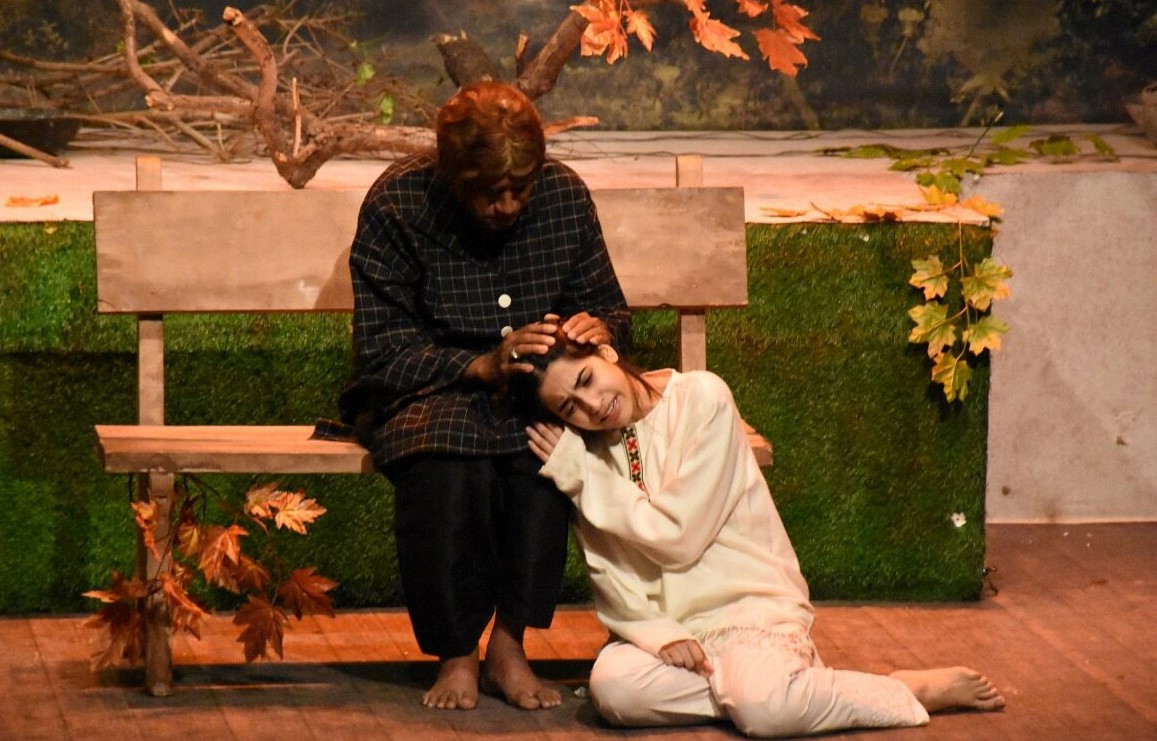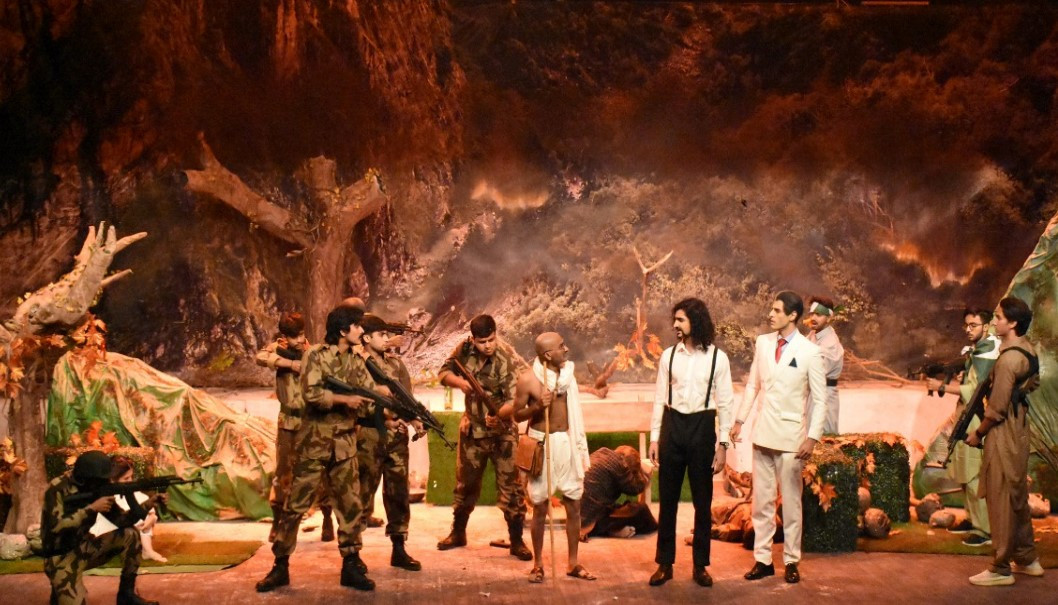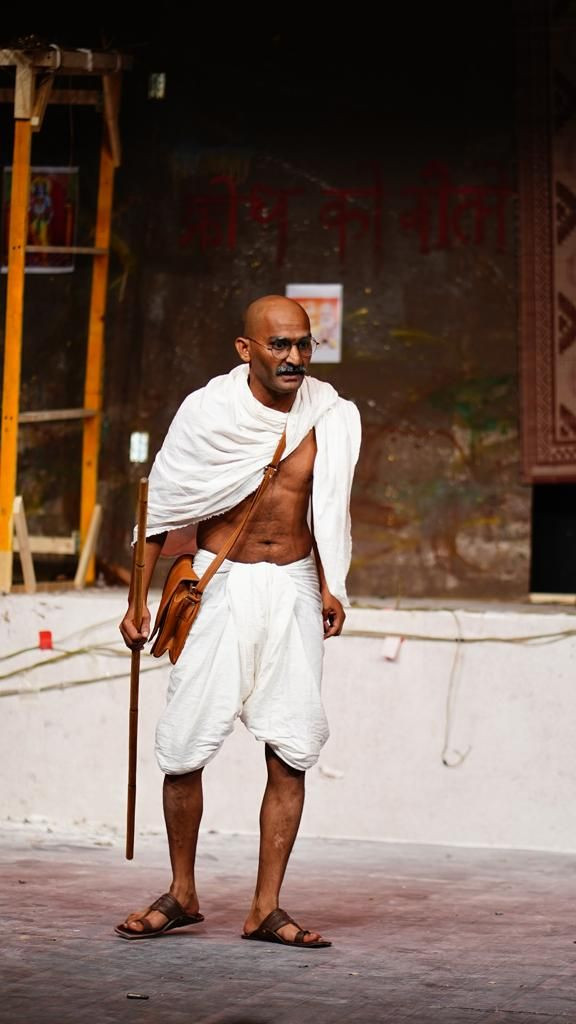
Written by Anwar Maqsood, the play is an entertainer steering murder accusations against Jinnah and Gandhi
KARACHI:
Acclaimed author Saadat Hasan Manto once wrote, “Pakistan had become independent soon after its inception but man was still a slave in both these countries–the slave of prejudice, of religious fanaticism, of barbarity and inhumanity.”
Whether the above statement holds any merit or not is another debate, the real question is if the founders of the respective countries would have imagined the promised homelands to be plagued by such vices. Did their dreams of independent nations include the notions of slavery? Perhaps yes, but neither of them lived enough to see through the tragedy that unfolded after Partition.
Legendary playwright Anwar Maqsood, known for his Independence special plays Sawa 14 August and Pawnay 14 August, took 10 years to write an end to his trilogy--- and with this one, he brought back characters from the past to witness the political, economic, and social turmoil in the countries they envisioned and created.
Saadhay 14 August begins with an allegation–an accusation of murder against two significant personalities. It sees Winston Churchill, the former premier of the United Kingdom, demanding Muhammad Ali Jinnah (Omar Kazi) and Mohandas Karamchand Gandhi (Tanveer Gill) to appear in court, and answer for the alleged mass murder of people who lost their lives during the Partition of India. But before Jinnah and Gandhi are summoned to London, Maqsood takes them on a stroll through Indian Illegally Occupied Jammu and Kashmir (IIOJK), Pakistan’s Lahore, and India’s Delhi to observe the quality of life in 2022. The brilliance of Maqsood’s writing is that it entices laughter even during serious scenes. One such moment takes place in Kashmir, where a father is seen protecting his daughter, the only family he has left, during a cross-fire, as Jinnah lights up a cigar from the ashes of a “freshly” dead person.
And it’s not a haha-that’s-so-funny kind of a hysterical laugh. Maqsood throws in one-liners that do make you laugh but also punch you in the gut, thinking how numb we’ve all become about the terrible deteriorating state of the country. The audience laughs because they can relate to the corrupt, inhumane, blind following on stage.
Nobody seems to recognise or respect the two figures in front of them though, in either of the cities they visit. Even when they do, they’re never in sync with their “crazy” peaceful opinions. As they visit all three places, curious, they only have one question to ask the inhabitants: Are you happy in this country?
The brilliance of Maqsood’s writing is that it entices laughter even during serious scenes. One such moment takes place in Kashmir, where a father is seen protecting his daughter, the only family he has left, during a cross-fire, as Jinnah lights up a cigar from the ashes of a “freshly” dead person.
And it’s not a haha-that’s-so-funny kind of a hysterical laugh. Maqsood throws in one-liners that do make you laugh but also punch you in the gut, thinking how numb we’ve all become about the terrible deteriorating state of the country. The audience laughs because they can relate to the corrupt, inhumane, blind following on stage.
Nobody seems to recognise or respect the two figures in front of them though, in either of the cities they visit. Even when they do, they’re never in sync with their “crazy” peaceful opinions. As they visit all three places, curious, they only have one question to ask the inhabitants: Are you happy in this country?
 As they walk through the loud, hateful, insensitive emotions of people against the neighbouring countries, they are reminded that Partition was not just an event of the past. Its legacy is threaded into the daily lives of subsequent generations. The two remained unscathed by the perils of society in both nations– all they cared about was which country was doing better; although the standard of “better” nobody cared for. It seemed like a competition, and perhaps it always was.
After almost being killed by the soldiers placed in IIOJK, attacked by die-hard political party enthusiasts at Minar-e-Pakistan, and by BJP leaders on what seemed like a state-sponsored film set in Delhi, the leaders knew that the peace and progress they possibly envisioned were far from reality. Manto's words turn out to be the reality unfolding in front of them.
As they walk through the loud, hateful, insensitive emotions of people against the neighbouring countries, they are reminded that Partition was not just an event of the past. Its legacy is threaded into the daily lives of subsequent generations. The two remained unscathed by the perils of society in both nations– all they cared about was which country was doing better; although the standard of “better” nobody cared for. It seemed like a competition, and perhaps it always was.
After almost being killed by the soldiers placed in IIOJK, attacked by die-hard political party enthusiasts at Minar-e-Pakistan, and by BJP leaders on what seemed like a state-sponsored film set in Delhi, the leaders knew that the peace and progress they possibly envisioned were far from reality. Manto's words turn out to be the reality unfolding in front of them.
1662357200-1/mobile_file_2022-09-03_07-35-50--(1)1662357200-1.jpg) With the help of their investigation officer (Jahanzeb Ali Shah), they somehow reach London and even see a cameo of Altaf Hussain and George Galloway, but upon being summoned to the court, the judge fails to give out a judgement.
Directed by Dawar Mehmood from KopyKats Production, the play has musical bits in between the scenes. Minus the needless item song that had no meaning whatsoever, Jinnah and Gandhi’s visits are preceded by an introduction of sorts of the city they’re about to visit. With London and Lahore having a chirpy, vibrant introduction to its culture with everyone tapping their feet and enjoying the mini acts, the ride from Lahore to Delhi is nothing short of a horrifying reminder of the man-slaughter that Partition was.
With Jinnah and Gandhi on a train, a bloody red light takes over the auditorium. There’s nothing that can be heard above the screams of families trying to flee to the other side. For a tiny second, you see the two leaders reflect and regret the Independence they fought for, thinking about how hatred was not what they wanted out of it.
With the help of their investigation officer (Jahanzeb Ali Shah), they somehow reach London and even see a cameo of Altaf Hussain and George Galloway, but upon being summoned to the court, the judge fails to give out a judgement.
Directed by Dawar Mehmood from KopyKats Production, the play has musical bits in between the scenes. Minus the needless item song that had no meaning whatsoever, Jinnah and Gandhi’s visits are preceded by an introduction of sorts of the city they’re about to visit. With London and Lahore having a chirpy, vibrant introduction to its culture with everyone tapping their feet and enjoying the mini acts, the ride from Lahore to Delhi is nothing short of a horrifying reminder of the man-slaughter that Partition was.
With Jinnah and Gandhi on a train, a bloody red light takes over the auditorium. There’s nothing that can be heard above the screams of families trying to flee to the other side. For a tiny second, you see the two leaders reflect and regret the Independence they fought for, thinking about how hatred was not what they wanted out of it.
 Gill as Gandhi deserved the standing ovation he got from the audience that night. From perfecting the walk and body language to nailing the various emotions in the play, Gill made a great Gandhi. However, the same cannot be said about Kazi who played Jinnah. That also makes you not complain about the larger stage time that Gandhi gets as opposed to Jinnah in the play. With a little less cigar play and more focus on dialogue delivery, the play could've been a better experience altogether.
Gill as Gandhi deserved the standing ovation he got from the audience that night. From perfecting the walk and body language to nailing the various emotions in the play, Gill made a great Gandhi. However, the same cannot be said about Kazi who played Jinnah. That also makes you not complain about the larger stage time that Gandhi gets as opposed to Jinnah in the play. With a little less cigar play and more focus on dialogue delivery, the play could've been a better experience altogether.
 The brilliance of Maqsood’s writing is that it entices laughter even during serious scenes. One such moment takes place in Kashmir, where a father is seen protecting his daughter, the only family he has left, during a cross-fire, as Jinnah lights up a cigar from the ashes of a “freshly” dead person.
And it’s not a haha-that’s-so-funny kind of a hysterical laugh. Maqsood throws in one-liners that do make you laugh but also punch you in the gut, thinking how numb we’ve all become about the terrible deteriorating state of the country. The audience laughs because they can relate to the corrupt, inhumane, blind following on stage.
Nobody seems to recognise or respect the two figures in front of them though, in either of the cities they visit. Even when they do, they’re never in sync with their “crazy” peaceful opinions. As they visit all three places, curious, they only have one question to ask the inhabitants: Are you happy in this country?
The brilliance of Maqsood’s writing is that it entices laughter even during serious scenes. One such moment takes place in Kashmir, where a father is seen protecting his daughter, the only family he has left, during a cross-fire, as Jinnah lights up a cigar from the ashes of a “freshly” dead person.
And it’s not a haha-that’s-so-funny kind of a hysterical laugh. Maqsood throws in one-liners that do make you laugh but also punch you in the gut, thinking how numb we’ve all become about the terrible deteriorating state of the country. The audience laughs because they can relate to the corrupt, inhumane, blind following on stage.
Nobody seems to recognise or respect the two figures in front of them though, in either of the cities they visit. Even when they do, they’re never in sync with their “crazy” peaceful opinions. As they visit all three places, curious, they only have one question to ask the inhabitants: Are you happy in this country?
 As they walk through the loud, hateful, insensitive emotions of people against the neighbouring countries, they are reminded that Partition was not just an event of the past. Its legacy is threaded into the daily lives of subsequent generations. The two remained unscathed by the perils of society in both nations– all they cared about was which country was doing better; although the standard of “better” nobody cared for. It seemed like a competition, and perhaps it always was.
After almost being killed by the soldiers placed in IIOJK, attacked by die-hard political party enthusiasts at Minar-e-Pakistan, and by BJP leaders on what seemed like a state-sponsored film set in Delhi, the leaders knew that the peace and progress they possibly envisioned were far from reality. Manto's words turn out to be the reality unfolding in front of them.
As they walk through the loud, hateful, insensitive emotions of people against the neighbouring countries, they are reminded that Partition was not just an event of the past. Its legacy is threaded into the daily lives of subsequent generations. The two remained unscathed by the perils of society in both nations– all they cared about was which country was doing better; although the standard of “better” nobody cared for. It seemed like a competition, and perhaps it always was.
After almost being killed by the soldiers placed in IIOJK, attacked by die-hard political party enthusiasts at Minar-e-Pakistan, and by BJP leaders on what seemed like a state-sponsored film set in Delhi, the leaders knew that the peace and progress they possibly envisioned were far from reality. Manto's words turn out to be the reality unfolding in front of them.
1662357200-1/mobile_file_2022-09-03_07-35-50--(1)1662357200-1.jpg) With the help of their investigation officer (Jahanzeb Ali Shah), they somehow reach London and even see a cameo of Altaf Hussain and George Galloway, but upon being summoned to the court, the judge fails to give out a judgement.
Directed by Dawar Mehmood from KopyKats Production, the play has musical bits in between the scenes. Minus the needless item song that had no meaning whatsoever, Jinnah and Gandhi’s visits are preceded by an introduction of sorts of the city they’re about to visit. With London and Lahore having a chirpy, vibrant introduction to its culture with everyone tapping their feet and enjoying the mini acts, the ride from Lahore to Delhi is nothing short of a horrifying reminder of the man-slaughter that Partition was.
With Jinnah and Gandhi on a train, a bloody red light takes over the auditorium. There’s nothing that can be heard above the screams of families trying to flee to the other side. For a tiny second, you see the two leaders reflect and regret the Independence they fought for, thinking about how hatred was not what they wanted out of it.
With the help of their investigation officer (Jahanzeb Ali Shah), they somehow reach London and even see a cameo of Altaf Hussain and George Galloway, but upon being summoned to the court, the judge fails to give out a judgement.
Directed by Dawar Mehmood from KopyKats Production, the play has musical bits in between the scenes. Minus the needless item song that had no meaning whatsoever, Jinnah and Gandhi’s visits are preceded by an introduction of sorts of the city they’re about to visit. With London and Lahore having a chirpy, vibrant introduction to its culture with everyone tapping their feet and enjoying the mini acts, the ride from Lahore to Delhi is nothing short of a horrifying reminder of the man-slaughter that Partition was.
With Jinnah and Gandhi on a train, a bloody red light takes over the auditorium. There’s nothing that can be heard above the screams of families trying to flee to the other side. For a tiny second, you see the two leaders reflect and regret the Independence they fought for, thinking about how hatred was not what they wanted out of it.
 Gill as Gandhi deserved the standing ovation he got from the audience that night. From perfecting the walk and body language to nailing the various emotions in the play, Gill made a great Gandhi. However, the same cannot be said about Kazi who played Jinnah. That also makes you not complain about the larger stage time that Gandhi gets as opposed to Jinnah in the play. With a little less cigar play and more focus on dialogue delivery, the play could've been a better experience altogether.
Gill as Gandhi deserved the standing ovation he got from the audience that night. From perfecting the walk and body language to nailing the various emotions in the play, Gill made a great Gandhi. However, the same cannot be said about Kazi who played Jinnah. That also makes you not complain about the larger stage time that Gandhi gets as opposed to Jinnah in the play. With a little less cigar play and more focus on dialogue delivery, the play could've been a better experience altogether.
Source link
https://www.news.qm.com.pk/guilt-laughing-at-misery-of-india-pakistan/?feed_id=247217


0 Comments